Wells House offers a wide array of substance use disorder services adult men and women 18+. Our mental health professionals are skilled at helping patients with mental health disorders such as depression, anxiety, and eating disorders’, etc… Family members play an important role in the dependency recovery process and are encouraged to participate in the client’s recovery.
Many people who come to the Wells House seeking treatment for their drug or alcohol dependency may also struggle with mental health issues such as depression, eating disorders, grief, anxiety, or post-traumatic stress disorder. This combination of dependency along with a mental health issue is called “co-substance use disorder” and, in fact, is quite common. has medical staff, psychologists, and counselors on-site who are skilled at addressing the complexity of issues around co-substance use disorders and mental health.
The Wells House focuses first and foremost on making sure we have the best solution for your unique clinical needs. The process begins by contacting the Wells House and helping us understand your situation. Next, you will fill out a Pre-Screen to determine whether or not our program at the Wells House is the best treatment for your needs. If it is determined that our program is the best program for you, our expert, caring team will work hard to ensure you get help as quickly as possible. Call us Monday-Friday 8:00 a.m. – 4:30 p.m.
Yes. Please contact the Wells House at 301-739-7748 for further details.
It depends on the type and the intensity of the treatment services you need. We provide a range of services from outpatient treatment to residential treatment, where people live with us for 4 to 6 weeks or longer in order to get the help they need. Much of the cost of treatment can be covered by insurance.
Patients must meet ASAM criteria for IOP or OP in order to be eligible for admission to our program. We also offer 3.1 services so patients would need to meet 3.1 criteria for that program if they are requesting it.
Our program is NOT an inpatient facility. We do not require lock-down of our patients and structure comes in the form of group schedule, case management referrals and curfew in the evening at 10 pm. During the day, outside of their scheduled group time, patients are free to come and go as they would living in the community. They are encouraged to attend mental health appointments and medical appointments if needed, twelve step meetings and to seek and maintain employment while in our program. All patients are required to sign in at 5 pm each day and curfew for all patients in our residential setting is 10 pm.
Our program is not a zero tolerance program and we realize that relapse may happen. We work with patients in their current stage of change and utilize our clinical staff to assist patients with cognitive and behavioral changes that will assist them in achieving sobriety. If they are not successful in one of our levels of care we refer them to the appropriate treatment program where they are more likely to be successful, including inpatient treatment or hospitalization.
Not necessarily. It depends on the nature of the infraction. If patients are unable to follow the rules and policies to remain in our residential program we typically allow them to continue in treatment and assist them in finding outside housing in the community or with family.
We accept self-referrals and referrals from the community including other treatment programs, jails and family members

